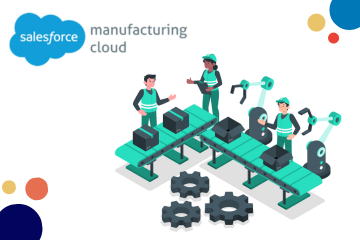Today, digital disruption is starting to occur in the manufacturing sector. And in this scenario, an organization capacity to adapt to digital change determines its chances of survival and competitive advantage.
Consequently, it is very important for manufacturers today to implement highly effective solutions like Manufacturing Cloud to prioritize customer-centric methods and increase competitiveness.
Opting for Salesforce Manufacturing Cloud is unquestionably a winning strategy for manufacturers. This decision brings a plethora of advantages, which we will delve into in this blog.
But before we get into the details, let us provide you with a basic understanding of what Manufacturing Cloud is.
What is Manufacturing Cloud?
Salesforce Manufacturing Cloud is a solution catering to manufacturing industries. It enables collaboration, enhances visibility, and improves decision-making across the manufacturing process.
What is included in Salesforce Manufacturing Cloud?
Manufacturing Cloud offers objects, features, tools, and applications designed exclusively for the manufacturing business.
Its key features include:
- Operations management
- Customer relationship management
- Supply chain & Order Management
What are the Benefits of Salesforce Manufacturing Cloud?
Centralized Inventory Management
Efficient inventory management is the backbone of manufacturing operations. And Salesforce CRM provides manufacturers with a unified platform to manage inventory in real time.
Manufacturers gain a holistic view of their inventory and journey by combining data from various sources, including production, distribution, and sales. In addition, this centralized approach not only reduces the risk of overstock or stockouts but also enables precise demand forecasting.
Salesforce robust inventory management tools empower manufacturers to optimize stock levels. As a result, it minimizes carrying costs and enhances overall operational efficiency.
Real-time Visibility into the Supply Chain
Salesforce CRM extends its capabilities to offer real-time visibility into the entire supply chain. Manufacturers can track the movement of raw materials, monitor production processes, and oversee the distribution of finished goods.
Moreover, this level of transparency is invaluable in identifying potential bottlenecks, mitigating risks, and ensuring smooth operations.
With Salesforce, manufacturers can respond promptly to changes in demand, supplier issues, or unexpected disruptions. Ultimately, this results in a more agile and resilient supply chain.
Supplier Collaboration and Management
Effective collaboration with suppliers is critical for a seamless supply chain. Therefore, Salesforce facilitates supplier relationship management by providing a centralized platform for communication and collaboration.
Through features like Chatter, manufacturers can communicate with suppliers in real time, share updates, and address issues promptly. This streamlined communication enhances collaboration, reduces lead times, and fosters stronger partnerships with suppliers.
Additionally, Salesforce analytics tools can help manufacturers evaluate supplier performance and make data-driven decisions when selecting or optimizing suppliers.
Demand Forecasting and Planning
Salesforce analytics and AI capabilities help manufacturers to forecast demand with greater accuracy. By analyzing historical data, market trends, and customer behavior, manufacturers can make informed predictions about future demand.
In addition, this empowers them to optimize production schedules, plan inventory levels, and allocate resources effectively as needed.
Salesforce demand planning tools contribute to reducing excess inventory and minimizing waste. Also, it ensures that products are available when and where they are needed.
Automated Order Fulfillment
Efficient order fulfillment is a key component of supply chain management. Salesforce automates and streamlines the order fulfillment process, from order creation to shipment.
This automation not only reduces manual errors but also accelerates the order-to-cash cycle. By integrating with other systems, such as ERP, Salesforce ensures seamless communication between various stages of the supply chain, providing a cohesive and efficient fulfillment process.
Wrapping it up!
Salesforce impact on the manufacturing industry goes beyond customer relationship management. It extends to the very core of operations, collaboration, and supply chain management.
By leveraging Salesforce CRM capabilities, manufacturers can unlock new levels of efficiency, agility, and innovation. And the platforms ability to centralize inventory, enhance supply chain visibility, and facilitate collaboration with suppliers positions it as a transformative force in the manufacturing sector, driving industry leaders toward a more connected and responsive future.







Comments